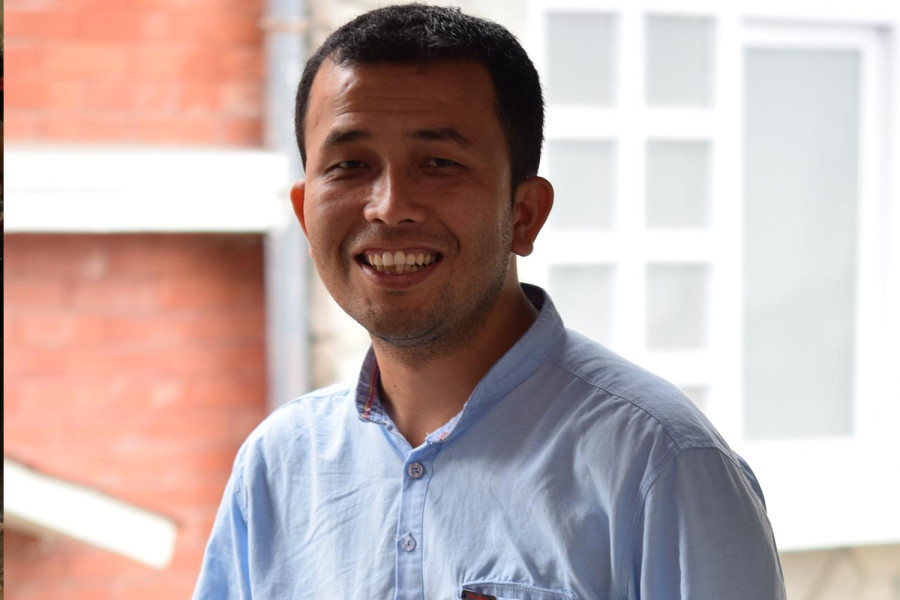Books
Amplifying unheard voices
Kalimpong-based writer Chuden Kabimo reflects on the socio-political essence of his works, and his upcoming book ‘Urmaal’.
Sanskriti Pokharel
Chuden Kabimo is a writer based in Kalimpong, India. He holds a master’s degree in political science and began writing short stories very young. His short stories collection ‘1986’ won the 2018 Yuva Sahitya Akademi Award. His first novel, ‘Fatsung’, has been translated into English, Bangla, Sindhi, and Hindi. The English version, ‘Song of the Soil’, was shortlisted for India’s JCB Award 2022.
His new book ‘Urmaal’ will be released on January 18.
In this conversation with the Post’s Sanskriti Pokharel, Kabimo discusses the influence of his background on his writing and the balance between political commentary and storytelling.
Growing up in the remote village of Malbung in India, did you gravitate more towards Hindi or Nepali literature?
Even though Malbung is a small village in the Kalimpong district of West Bengal, our dialect has always been Nepali. So, naturally, I gravitated toward Nepali literature.
Malbung, during my childhood, was untouched by modern developments. No roads, television, or mobile phones connected us to the outside world. In that quiet isolation, reading became my escape. I walked for two to three hours to reach the nearest government library. Every Tuesday, when my father made his weekly trip to the market, he bought Nepali novels for me.
Books, especially those penned by Prakash Kovid and Subash Ghising, were my companions. Reading was the only pastime that absorbed me. I always carried a novel while grazing cows and goats in the fields. It wouldn’t be wrong to say that books became my addiction from a very young age.
Do your personal experiences shape the stories you tell?
Absolutely. When I work on a novel, my experiences, the things I have seen, felt, and lived through, naturally find their way into my writing. It’s not always intentional; they slip in quietly and blend with the characters and scenarios I create.
I am drawn to telling the stories of people from underrepresented communities. This connection stems from my roots, as I grew up in an often overlooked community.
These experiences have shaped my perspective and the stories I feel compelled to tell. In a way, my journey becomes inseparable from the narratives I craft.
Does literature merely reflect society, or does it go beyond that?
Most people say that literature is a reflection of society. But I do not completely agree with that. Writers add their imagination and artistic style, adding layers to the reflection. But still, literature is the easiest medium to showcase society and the thoughts of people residing there.
The Gorkhaland Movement plays a central role in ‘Fatsung’. How did you balance political commentary with storytelling?
During my college years, I was navigating the journalism field, and during this time, the Gorkhaland Movement was gaining momentum. As a journalist, I had the opportunity to witness the movement up close, hear its voices, and understand its impact.
When I began writing ‘Fatsung’, my intent was clear: I didn’t want to merely present an informative account of the movement; I tried to weave a compelling story. The experiences and observations I gathered during those years naturally found their way into the narrative.
The novel revolves around three main characters, each composite of the 30 to 40 people I spoke with while researching the movement. These fictional characters are built upon the conversations, emotions, and discourses I encountered. Through them, I sought to capture the human essence of the movement while intertwining it with political commentary.
‘Fatsung’ has been translated into multiple languages. What were the challenges in maintaining the story’s soul through translation?
The more language it got translated into, the wider the audience it reached. However, maintaining the essence and soul of the story through translation is no small task. It’s a delicate art entrusted to the translators rather than me.
While I can read and appreciate the Hindi and English versions, I cannot decipher Bengali or Sindhi. This means I must place complete trust in the translators to preserve the spirit and integrity of the narrative. When the translators translated my book, it was not just my book; it became their creation, their book as well. So, I believe they did not let the soul of ‘Fatsung’ die while translating.
Your new book ‘Urmaal’ is about tea garden workers. Can you share what inspired you to tell their story?
The lives of tea garden workers are far harsher than most people imagine. It has been nearly two centuries since tea cultivation began in Darjeeling, and generation after generation of workers has been involved in a cycle of toil. Their day begins at the break of dawn when the siren buzzes at 5 am, and they are compelled to start working immediately. They labour tirelessly until the evening, only to return home when the siren signals the end of the day. Their existence is dictated entirely by the sound of those sirens with no agency over their lives.
Despite working from morning to night, their economic condition remains so dire that they struggle to meet basic needs. While people worldwide begin their mornings with a warm cup of tea, the individuals responsible for cultivating those tea leaves endure lives of hardship.
This contrast made me question something deeper. We have countless books celebrating tea varieties—their aromas, flavours, and origins—but how often do we hear about the hands that nurture and harvest them? Why are their stories so seldom told? This curiosity and the need to amplify their voices inspired me to tell their stories.
Chuden Kabimo’s five book recommendations
The Good Earth
Author: Pearl S Buck
Publisher: John Day
Year: 1931
This book narrates the tale of a Chinese farmer and his family in traditional agrarian China.
Blasphemy
Author: Tehmina Durrani
Publisher: Penguin India
Year: 1998
I was deeply touched by how the writer has portrayed violence against women in this novel.
My Name is Radha
Author: Saadat Hasan Manto
Publisher: Penguin India
Year: 2015
Very few can capture the complexities of border issues and the struggles of sex workers like Manto.
Khabuj
Author: Benyamin
Publisher: FinePrint (Nepali)
Year: 2008
Benyamin’s ability to adapt and flow like water within the narrative makes this book truly special.
The Tokolosh
Author: Ronald Segal
Publisher: Sheed & Ward
Year: 1960
This simple book highlights the responsibility of taking ownership and doing one’s work honestly.




 9.89°C Kathmandu
9.89°C Kathmandu










